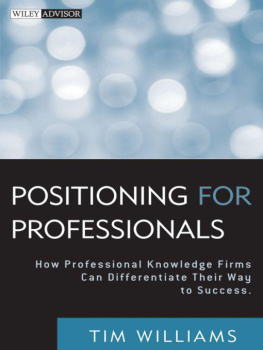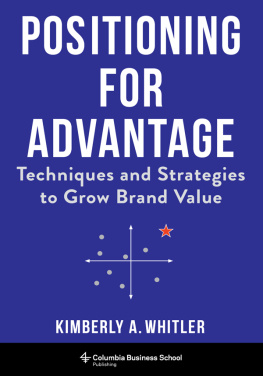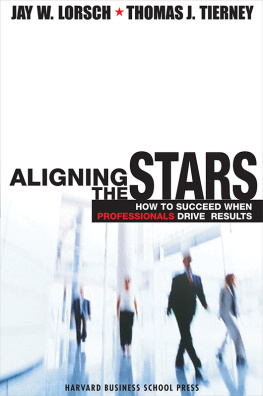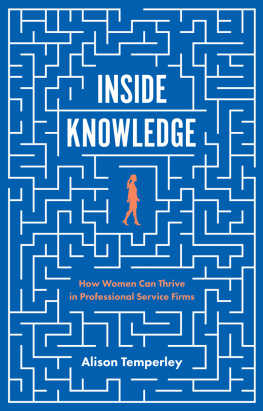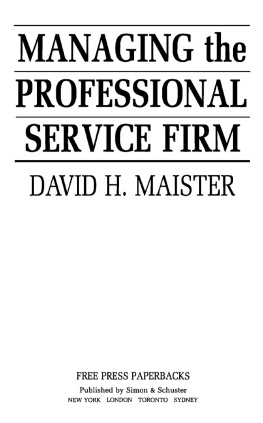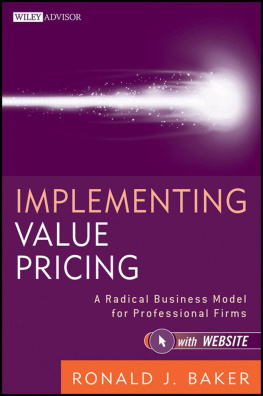Table of Contents
Copyright 2010 by Tim J.Williams. All rights reserved.
Published by John Wiley & Sons, Inc., Hoboken, New Jersey.
Published simultaneously in Canada.
No part of this publication may be reproduced, stored in a retrieval system, or transmitted in any form or by any means, electronic, mechanical, photocopying, recording, scanning, or otherwise, except as permitted under Section 107 or 108 of the 1976 United States Copyright Act, without either the prior written permission of the Publisher, or authorization through payment of the appropriate per-copy fee to the Copyright Clearance Center, Inc., 222 Rosewood Drive, Danvers, MA 01923, (978) 750-8400, fax (978) 646-8600, or on the web at www.copyright.com. Requests to the Publisher for permission should be addressed to the Permissions Department, John Wiley & Sons, Inc., 111 River Street, Hoboken, NJ 07030, (201) 748-6011, fax (201) 748-6008, or online at www.wiley.com/go/permissions.No part of this publication may be reproduced, stored in a retrieval system, or transmitted in any form or by any means, electronic, mechanical, photocopying, recording, scanning, or otherwise, except as permitted under Section 107 or 108 of the 1976 United States Copyright Act, without either the prior written permission of the Publisher, or authorization through payment of the appropriate per-copy fee to the Copyright Clearance Center, Inc., 222 Rosewood Drive, Danvers, MA 01923, (978) 750-8400, fax (978) 646-8600, or on the web at www.copyright.com. Requests to the Publisher for permission should be addressed to the Permissions Department, John Wiley & Sons, Inc., 111 River Street, Hoboken, NJ 07030, (201) 748-6011, fax (201) 748-6008, or online at www.wiley.com/go/permissions. (201) 748-6008, or online at www.wiley.com/go/permissions.
Limit of Liability/Disclaimer of Warranty: While the publisher and author have used their best efforts in preparing this book, they make no representations or warranties with respect to the accuracy or completeness of the contents of this book and specifically disclaim any implied warranties of merchantability or fitness for a particular purpose. No warranty may be created or extended by sales representatives or written sales materials. The advice and strategies contained herein may not be suitable for your situation. You should consult with a professional where appropriate. Neither the publisher nor author shall be liable for any loss of profit or any other commercial damages, including but not limited to special, incidental, consequential, or other damages.
For general information on our other products and services or for technical support, please contact our Customer Care Department within the United States at (800) 762-2974, outside the United States at (317) 572-3993 or fax (317) 572-4002. (317) 572-4002.
Wiley also publishes its books in a variety of electronic formats. Some content that appears in print may not be available in electronic books. For more information about Wiley products, visit our web site at www.wiley.com.
Library of Congress Cataloging-in-Publication Data:
Williams, Tim, 1954
Positioning for professionals : how professional knowledge firms can differentiate their way to success / Tim Williams. p. cm.
Includes index.
ISBN 978-0-470-58715-7 (hardback); 978-0-470-87735-7 (ebk); 978-0-470-87751-7 (ebk); 978-0-470-87752-4 (ebk)
1. Branding (Marketing) 2. Success in business. I. Title. HF5415.1255.W.827dc22
2010021337
To my wife and lifetime companion, Christine
Introduction
Quick, which airline do you associate with the following? We invite you to sit back, relax, and enjoy your flight with us today. If theres anything we can do to make your flight more enjoyable, please just let us know.
Your answer is probably every airline. Thats because pretty much every airline uses the same language on every flight. There is, of course, the government-mandated safety language that every airline must include in its on-board announcements; but beyond that there is a missed opportunity for airlines to say something different . Theres also an opportunity for airlines to do something different, but most dont. The result is that you dont know whether youre flying Delta, United, or American. And chances are you dont care.
The airlines are just doing what most other companies do: copying their competitors. In a business context, imitation is not the most sincere form of flattery; its just lazy. When you really think about it, copying someone elses business model demonstrates an incredible lack creativity and imagination. Yet most business and brands are just copies of someone elses.
Most managers invest their time and energy in trying to make their brands better, when in fact they should be working to make their brands different . Better isnt necessarily always better; different is better. Behind the scenes, American Airlines may be working hard to recruit the best people, deliver the most efficient service, and build the best maintenance record. But most of that means very little to customers unless their experience with American is actually different than with other airlines.
NO SUCH THING AS A COMMODITY
One definition of a brand is that consumers are willing to spend more money for it than for a similar product in the category. Airlines no doubt feel that they are in a constant price war with their competitors. Their explanation will be that airline travel is viewed as a commodity, and that their customers just want to get from point A to point B at the lowest price. The problem is that there is really no such thing as a commodity.
Organizations like airlines feel that they are a special case, that other categories are much easier to brand than theirs. Their defense is that a brand like Starbucks has a real advantage since its obviously easier to develop strong brand affinity for a coffee house than an airline. Really? Why then were there no strong coffee house brands until Starbucks came along? Starbucks built a reputation selling a product thats over 90 percent water. Thats because they understand that theyre not just selling a product, but the experience of the product.
Actually water itself is another startling example of the power of branding. Covering over 75 percent of the earths surface, it could be argued that water is the ultimate commodity. Nothing is so widely used and distributed as water. Yet millions of people are willing to pay up to one thousand times the cost tap water for one liter of it. Thats because of water quality questions, you say? That doesnt explain the pricing disparity between various brands of bottled water on the supermarket shelf. In a blind taste test, could one really discern the difference between Crystal Geyser spring water (selling for 59 cents per liter) and Evian spring water (selling for 99 cents per litervery close to double the price)? In restaurants, branded spring water can sell for up to $7.50 per liter.
If water can do it, why cant an airline? Or a hotel, or a steel company, or a law firm, or an advertising agency? They can. They just need to stop copying every hotel, steel company, law firm, or agency they compete with.
THE URGE TO COPY
The urge to copy is exceptionally strong in the human species. The underlying explanation is the copying mechanism that has allowed humans to survive and evolve for the past few millions years. The work of social observers like Mark Earls demonstrates the simple truth that humans are social creatures, not independent agents, and that as such they rely on copying to learn and survive in society. In fact, says Earls, Copying is our species number one learning and adaptive strategy.

